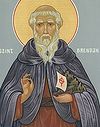 St. Theodore the Sanctified, disciple of St. Pachomius the Great (368).
St. Theodore the Sanctified, disciple of St. Pachomius the Great (368).  Uncovering of the relics of St. Ephraim, founder of Perekom Monastery (Novgorod) (1545).
Uncovering of the relics of St. Ephraim, founder of Perekom Monastery (Novgorod) (1545).
Hieromartyr Alexander, bishop of Jerusalem (ca. 213-250). Blessed child Musa of Rome (5th c.). Martyrs Vitus (Guy), Modestus, and Crescentia, at Lucania (ca. 303). 44 Monk-martyrs of the monastery of St. Sabbas the Sanctified (614). St. George II, bishop of Mytilene (9th c.). Sts. Cassian (1537) and Lawrence (1548), abbots, of Komel Monastery (Vologda). St. Matthew the Wonderworker, hieromonk, of Yaransk (1927). New Martyr Vukasin of Klepats in Hercegovina (1943).
Hieromartyrs Abdiesus, bishop of Beth-Kashar, and Abdas, bishop of Kashkar, with them 16 priests, 9 deacons, 6 monks, and 7 virgins, in Persia (ca. 418). St. Bardas, founder of the monastery of the Forerunner in Petra, Constantinople (5th c.-6th c.). St. Brendan the Voyager, abbot of Clonfert (577). Martyr Peter of Blachernae (ca. 761). St. Thomas I, patriarch of Jerusalem (820). St. Nicholas I Mysticus, patriarch of Constantinople (930). New Hieromartyr Theodore, bishop of Vrsac at Banat, Serbia (1594). New Martyr Nicholas of Metsovo, at Trikala (1617). Martyrs Symeon, Isaac, and Bachthisoes, of Persia (339). Synaxis of the Saints of Carpatho-Russia.
Sunday of the Blind Man. [Acts 16:16–34; John
9:1–38]
Simplicity of faith argues with crafty
unbelief. Faith, coming to the blind man who received
sight, enlightened his mind’s eyes, and he clearly
saw the truth. See how everything was logical for him.
They ask him: what do you say of Him who gave you sight?
He is a prophet, he answered, that is the messenger
of God, clothed in miracle-working power. An indisputably
true conclusion! But learned erudition does not want to
see this trueness and seeks to evade its consequences.
However, this being impossible, it approaches unlearned
simplicity with the suggestion: give God the praise: we
know that this man is a sinner. Simplicity of faith
does not know how to connect these
concepts—sinfulness and miracle-working, and
expresses this openly: Whether he be a sinner or no, I
know not: one thing I know, that, whereas I was blind, now
I see. What can one say against such deduction? But
the logic of the unbelievers is obstinate, and even in the
face of obviousness it is not ashamed to affirm that it
does not know where he who opened the blind man’s
eyes is from. Why herein is a marvellous thing, the
sensible logic of faith says to them, that ye know not
from whence He is, and yet He hath opened mine eyes. Now
we know that God heareth not sinners: but if any man be a
worshipper of God, and doeth His will, him he heareth.
Since the world began was it not heard that any man opened
the eyes of one that was born blind. If this man were not
of God, He could do nothing (John 9:17–33). It
would seem as though after this nothing remained other
than to bow down before the power of such a conclusion.
But learned erudition could not stand the sensible logic
of faith, and drove it away... Go now, prove the truth of
the faith to those whose mind has been corrupted with
obstinate unbelief. The unbelievers of all times are cut
from the same cloth.


![]() St. Theodore the Sanctified, disciple of St. Pachomius the Great (368).
St. Theodore the Sanctified, disciple of St. Pachomius the Great (368). ![]() Uncovering of the relics of St. Ephraim, founder of Perekom Monastery (Novgorod) (1545).
Uncovering of the relics of St. Ephraim, founder of Perekom Monastery (Novgorod) (1545). 













